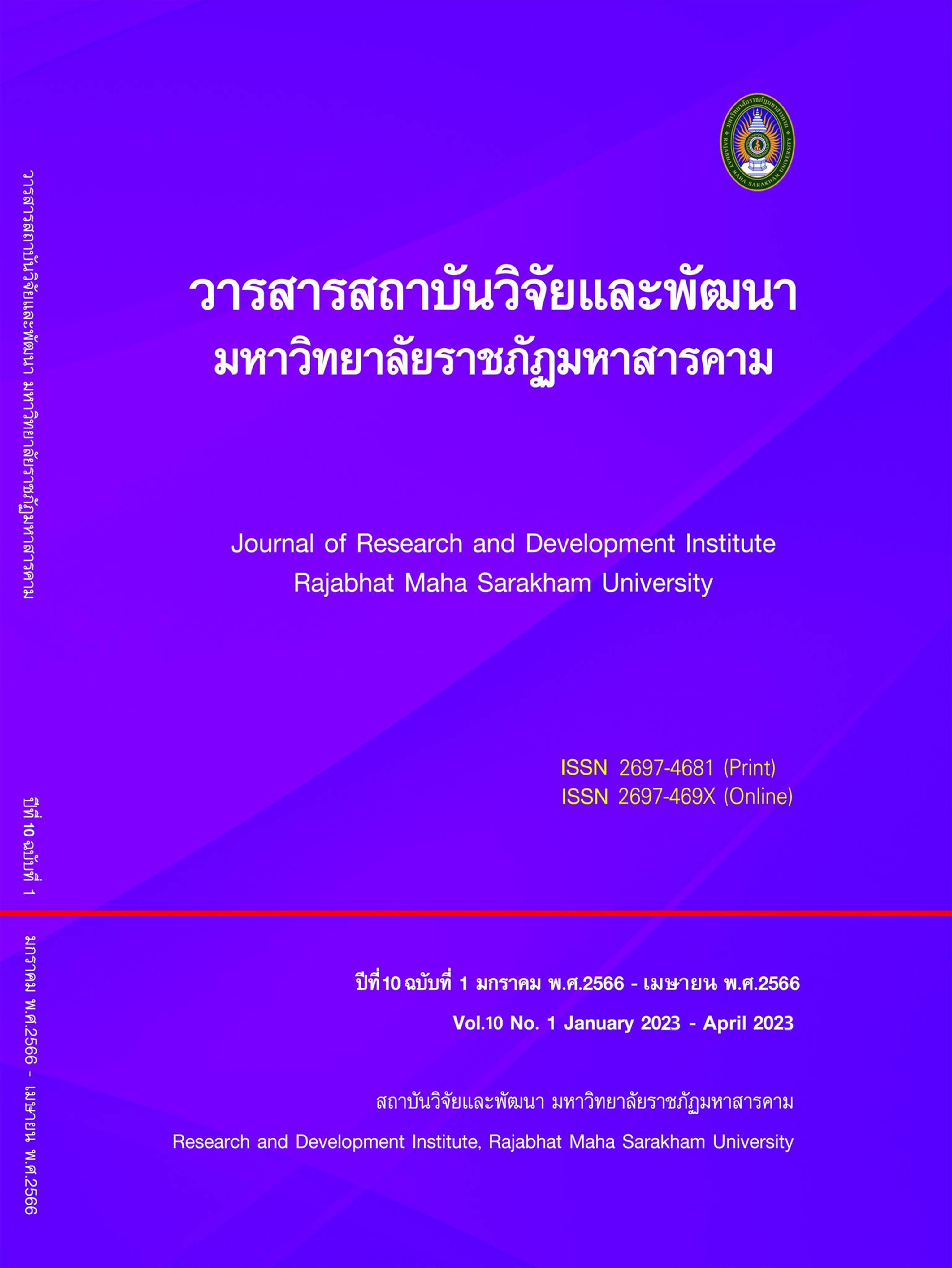การพัฒนากิจกรรมการเรียนรู้แบบสืบเสาะร่วมกับเว็บเควสท์ เรื่อง สิทธิมนุษยชน ชั้นมัธยมศึกษาปีที่ 4
คำสำคัญ:
กิจกรรมการเรียนรู้แบบสืบเสาะร่วมกับเว็บเควส, ผลสัมฤทธิ์ทางการเรียน, คุณลักษณะใฝ่เรียนรู้บทคัดย่อ
การวิจัยเรื่อง การพัฒนากิจกรรมการเรียนรู้แบบสืบเสาะร่วมกับเว็บเควส เรื่อง สิทธิมนุษยชน ชั้นมัธยมศึกษาปีที่ 4 กลุ่มตัวอย่างที่ใช้ในการวิจัยครั้งนี้ ได้แก่ นักเรียนชั้นมัธยมศึกษาปีที่ 4 โรงเรียนปทุมรัตต์พิทยาคม จังหวัดร้อยเอ็ด ภาคเรียนที่ 2 ปีการศึกษา 2564 จำนวน 1 ห้องเรียน คือ นักเรียนชั้นมัธยมศึกษาปีที่ 4/3 โดยวิธีการสุ่มแบบกลุ่ม รวมนักเรียนทั้งหมด 42 คน เครื่องมือที่ใช้ในการศึกษา ได้แก่ (1) แผนการจัดกิจกรรมการเรียนรู้แบบสืบเสาะร่วมกับเว็บเควส (2) แบบทดสอบวัดผลสัมฤทธิ์ทางการเรียน (3) แบบประเมินคุณลักษณะใฝ่เรียนรู้ และ (4) แบบสอบถามความพึงพอใจ สถิติที่ใช้ในการวิจัย คือ ค่าเฉลี่ย ส่วนเบี่ยงเบนมาตรฐาน และใช้การทดสอบที (t – test dependent)
ผลการวิจัยพบว่า (1) การพัฒนากิจกรรมการเรียนรู้แบบสืบเสาะร่วมกับเว็บเควส เรื่อง สิทธิมนุษยชน ชั้นมัธยมศึกษาปีที่ 4 โดยอยู่ในเกณฑ์ที่มีความเหมาะสมมากที่สุด (2) ผลสัมฤทธิ์ทางการเรียน เรื่อง สิทธิมนุษยชน ชั้นมัธยมศึกษาปีที่ 4 โดยการจัดการเรียนรู้แบบสืบเสาะร่วมกับเว็บเควส หลังเรียนสูงกว่าก่อนเรียน อย่างมีนัยสำคัญทางสถิติที่ระดับ .05 (3) ผลการวิเคราะห์คุณลักษณะใฝ่เรียนรู้ ของนักเรียนที่มีต่อการจัดการเรียนรู้แบบสืบเสาะร่วมกับเว็บเควส เรื่อง สิทธิมนุษยชน ชั้นมัธยมศึกษาปีที่ 4 คุณลักษณะใฝ่เรียนรู้ของนักเรียนอยู่ในระดับมาก (4) นักเรียนมีความพึงพอใจต่อการจัดการเรียนรู้แบบสืบเสาะร่วมกับเว็บเควส พบว่ามีค่าเฉลี่ยความพึงพอใจอยู่ในระดับมาก
เอกสารอ้างอิง
Brown, P., & Zahner, J. (2006). A quest to learn: The effects of a WebQuest on student learning in fourth grade social studies. State College, PA: The Pennsylvania State University.
Chaijaroen, S. (2017). High Constructivist Learning Environment Design Revised edition. Course teaching documents 212 931. Khon Kaen: Khon Kaen University.
Damkham, T. (2018). Improving English Reading Comprehension Skills of Mathayomsuksa-4 Students through Reading Strategy Instruction. Mahasarakham : Mahasarakham University.
Dodge, B. (1995). Some thoughts about WebQuests. San Diego, CA: University of San Diego.
Kwanwong, C. (2012). The development of web-based search lessons that promote critical thinking ability on Laws close to students in Grade 1. Maha Sarakham : Maha Sarakham Rajabhat University.
Ministry of Education. (2001). Guidelines for Student Development Activities According to the Basic Education Curriculum 2001. Bangkok: Department of Academic Affairs, Ministry of Education.
Nintanawongsa, S. (2018). The effect of webquest-based learning management on social studies learning achievement and learning enthusiasm of Mathayomsuksa 6 students. Bangkok: Ramkhamhaeng University.
Report on the implementation of the Basic National Educational Testing Elevation Project. (2020). Report on the implementation of the Basic National Educational Testing Elevation Project Report on the implementation of the Basic National Educational Testing Elevation Project at Pathumrat Pittayakom School for the academic year 2021. Roi Et.
Songwanna, L. (2010). he results of teaching and learning with webquest online lessons on basic graph theory on learning achievement and learning outcomes. Critical Thinking Ability of Mathayomsuksa 5 Students. Bangkok : Srinakharinwirot University.
Suthirat, C. (2009). 80 Learning management innovations that focus on learners. Bangkok: Danex Inter Corporation.
Thongwichit, W. (2012). The development of web-based search lessons (WebQuest) for the local history subject, Mathayomsuksa 1, together with knowledge creation theory. (Constructivism). Bangkok : King Mongkut's University of Technology North Bangkok.
UNICEF Thailand. (2021). Children cannot bear the effects of school closures for another year. [Online]. https://www.unicef.org/thailand/th/pressreleases/%E0%B9%80%E0%B8%94%E0% [24 April 2021]
ดาวน์โหลด
เผยแพร่แล้ว
รูปแบบการอ้างอิง
ฉบับ
ประเภทบทความ
สัญญาอนุญาต
ลิขสิทธิ์ (c) 2022 วารสารสถาบันวิจัยและพัฒนา มหาวิทยาลัยราชภัฏมหาสารคาม

อนุญาตภายใต้เงื่อนไข Creative Commons Attribution-NonCommercial-NoDerivatives 4.0 International License.
บทความที่ได้รับการตีพิมพ์เป็นลิขสิทธิ์เป็นของผู้ประพันธ์บทความ







